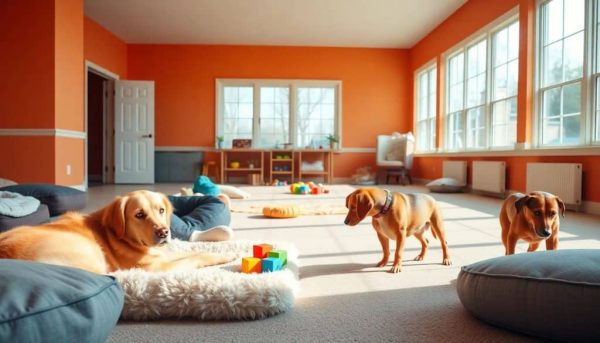Finding the right environment for your dog can be challenging, especially if your furry friend is not fond of other dogs. Fortunately, specialized dog day care services cater to such needs. These facilities allow dogs to thrive without the pressure of interacting with other canines.
In this article, we will explore various aspects of dog day care for dogs who don’t like other dogs, including the benefits of such programs, how to select a suitable day care, and tips for ensuring a positive experience for your pet.
The truth about dog day care
Dog day care is often misconceived as simply a place for dogs to socialize and play. In reality, quality day care facilities provide much more. They focus on individualized care and understand that not every dog enjoys the company of others.
Many day cares offer specialized programs, such as a Solo Dog program, which allows dogs to participate in activities tailored specifically for them. This approach is beneficial for dogs who may be anxious, reactive, or simply prefer solitude.
Understanding the unique needs of each dog is crucial. A well-run dog day care will create a structured environment that promotes emotional resilience and helps dogs build confidence.
Is dog day care good for dogs who don’t like other dogs?
Yes, dog day care can be beneficial even for dogs that are not social. Facilities that understand canine behavior can provide a nurturing atmosphere where dogs can engage in activities without forced interactions.

Many dogs benefit from mental stimulation and routine, which a good day care can offer. Activities might include training sessions, puzzle games, or solo playtime that keeps them engaged.
By allowing dogs to participate at their own comfort level, these facilities can help mitigate issues such as separation anxiety and behavioral problems that arise from boredom.
What dogs are well suited for dog day care?
Dogs that thrive in day care settings often possess certain traits. Here are some characteristics of dogs that do well:
- Dogs that are curious and enjoy exploring their environment.
- Canines with a moderate level of energy that can be effectively managed by staff.
- Dogs that respond well to training and commands.
- Pets that are comfortable in a structured environment.
Additionally, dogs that have previously participated in day care and have shown adaptability tend to excel in these settings. Understanding your dog's unique emotional thresholds is key to determining if they are suitable for day care.
What dogs are not good for day care?
Not all dogs are cut out for day care. Some might exhibit traits that make them unsuitable for a group environment. Here are a few examples:
- Dogs that display severe reactivity towards other dogs.
- Canines with significant anxiety issues that cannot be managed.
- Dogs that have not been adequately socialized or trained.
- Pets with a history of aggressive behavior towards other animals or humans.
It is essential to consult with professionals who can assess your dog's behavior before enrolling them in a day care program. Moreover, understanding your dog's reaction to various canine cues will aid in making an informed decision.

How to pick a good day care for your dog?
Selecting the right dog day care involves several considerations. Start by researching facilities that specialize in dog day care for dogs who don’t like other dogs. Look for reviews and testimonials from other pet owners.
Visit potential day cares in person. Pay attention to the cleanliness of the environment, the staff's interactions with animals, and the types of activities offered. A good day care will prioritize safety and comfort for all dogs.
Ask about their policies on managing dogs with behavioral issues and ensure they have trained personnel to handle emergencies. Transparency in operations is a sign of a reputable facility.
Signs of a bad dog day care
Recognizing a subpar dog day care is crucial for your pet's safety and well-being. Look for these warning signs:
- Unkempt or dirty facilities.
- Lack of supervision by trained staff.
- High levels of stress or anxiety observed in dogs.
- Poor communication regarding your dog's behavior and activities.
If you notice any of these signs, it might be best to look for alternative options. Your dog's health and happiness should always come first.
Tips for doing day care successfully
To ensure a successful experience in day care for your dog, consider the following tips:

- Introduce your dog gradually to the facility and staff to ease their transition.
- Communicate openly with the staff about your dog’s needs and behaviors.
- Monitor your dog's behavior after visits to gauge their comfort level.
- Participate in training sessions at home to enhance their adaptability.
Additionally, maintaining a consistent routine can help your dog feel more comfortable in the day care setting, reinforcing their emotional resilience.
Related questions about dog day care for dogs who don’t like other dogs
How to deal with a dog that doesn't like other dogs?
Dealing with a dog that doesn't like other dogs requires patience and understanding. Start by identifying the triggers of your dog's behavior. Gradual exposure to other dogs in controlled environments can help.
Utilizing professional training can also be beneficial. Trainers can provide effective strategies to help your dog become more comfortable around other dogs, focusing on positive reinforcement techniques.
How do you board a dog that doesn't like other dogs?
When boarding a dog that is not fond of other dogs, look for facilities that offer individual accommodations. Ensure that the boarding service is equipped to handle dogs with special needs.
Communicate your dog's preferences and dislikes to the boarding staff. A knowledgeable facility will create a comfortable environment that respects your dog's boundaries while still providing necessary care.
Is dog daycare stressful for dogs?
Dog daycare can be stressful for some dogs, particularly those that struggle with socialization. However, quality day cares should prioritize the emotional well-being of the dogs.

Staff should monitor stress levels and tailor activities accordingly. Providing a calm environment with space for dogs to retreat when feeling overwhelmed can significantly reduce stress.
What to do when dogs don't like each other?
When dogs don’t like each other, separation is often the best approach. Introducing them slowly and under supervision can help them adjust.
Consider consulting with a professional who understands canine behavior. They can offer valuable insights and techniques to help manage interactions effectively.
By respecting each dog's boundaries and recognizing their individual needs, owners can foster a more harmonious relationship between them.





Leave a Reply